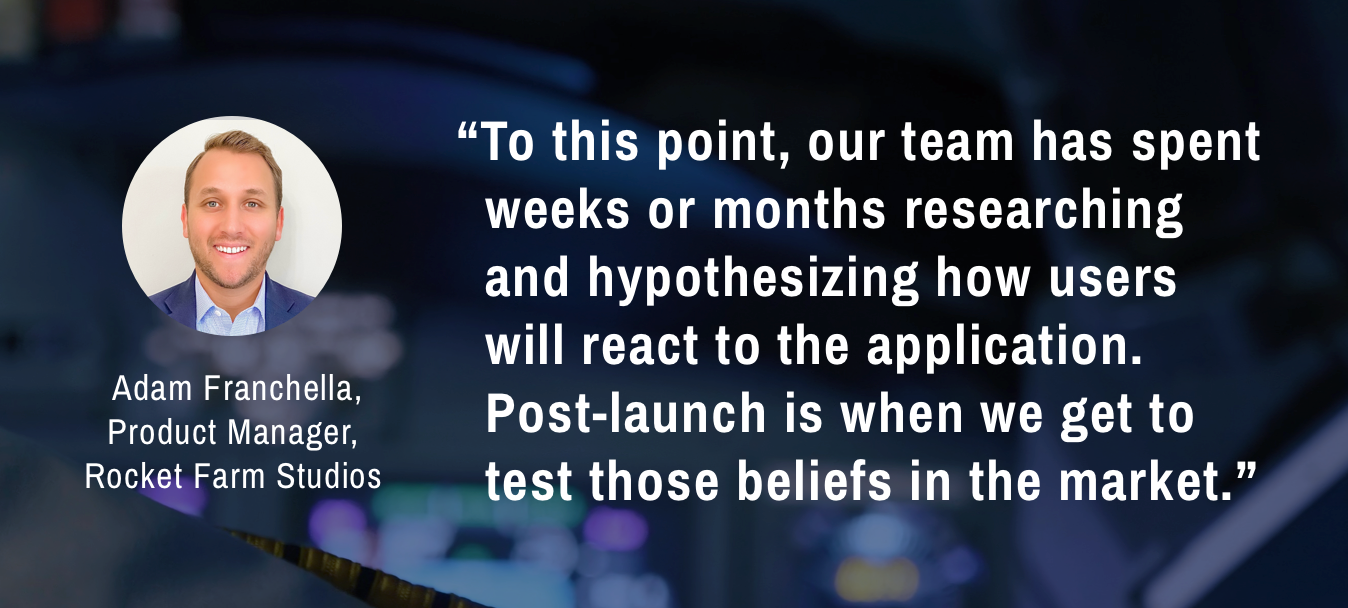Download our E-BOOK
Why You Absolutely Need a Product Manager for Mobile App Development
February 9, 2022
by Mahesh Patidar
Why do we need a product manager? Can’t we just take our feedback straight to the designer or developer? If I KNOW what I want, why do I need a product manager to get involved?
Those are common questions lobbed at mobile app developers. Maybe there is this (mis)perception that too many cooks in the kitchen will spoil the broth. Or maybe some businesses see an opportunity to reduce the budget by managing the product on their own. We think it’s more likely that people just don’t understand the value a product manager brings to any mobile app development project.
So, we decided to sit down with one of our own product management masters, Adam Franchella, to get the low-down on how product managers play a vital role in bringing digital products to market.
Product Manager vs Project Manager: A Quick Comparison
It’s not just semantics. Project managers oversee planning, procurement and execution of a project. They prevent scope creep, ensure deadlines are met and keep things on budget. Their job is to keep the project running smoothly. Project management is part of product management—but product managers also develop and guide strategy.
“The main value that product managers bring to the table that many project managers don’t is the big-picture business analysis. In my role, I am constantly analyzing a client’s business objectives, and we make design and development decisions to support those goals. At Rocket Farm, our product managers are true strategic business partners who ensure the product aligns with the overall business goals..” says Adam.
Product Manager
- Strategy: Focuses on long-term strategy and vision for the product.
- Scope: Owns the entire product lifecycle, from conception to market launch and post-launch optimization.
- Decision-making: Makes final decisions about what features to include or exclude based on alignment with business goals.
- Accountability: Owns the product and assumes full accountability for its success or failure.
- Business Objectives: Conducts business analysis to ensure the product aligns with business objectives.
- User-Centric: Prioritizes user experience and value delivery.
- Post-launch: Continuously monitors user feedback and key performance indicators (KPIs) to iterate and improve the product.
Project Manager
- Planning: Oversee planning, procurement, and execution of the project.
- Scope: Manages a predefined project scope, usually set by product management or executive stakeholders.
- Scheduling: Ensures deadlines are met, handling timelines and milestones.
- Budget: Manages budget and allocates resources effectively.
- Risk Management: Identifies, assesses, and manages risks to the project.
- Team Coordination: Ensures team members are aligned and tasks are completed as planned.
- Deliverables: Focuses on delivering the project on time, within scope, and on budget, but does not own the product.
Product Managers Command the Rocket
Think of your mobile app as the rocket. It takes a collective effort of designers, developers and marketing strategists to launch it. Now, think of the product manager as the commander of the rocket ship. Ultimately, your product manager is going to establish a clear focus and goals for the project and put a realistic plan in place. One that is doable from a scope, execution, manpower, resources and time point of view.
Product managers provide leadership, ranging from keeping teams motivated to navigating problems. They own the project and assume full accountability for keeping things moving, addressing issues, communicating, clearing up confusion and hitting deadlines. They manage all the ambiguity and shifting priorities that come with mobile app development. Perhaps most important: They are involved from Day 1, they know what must be delivered, and they are there to assure the quality of the product.
“Product managers are tasked with final decisions as to what’s in and what’s out, the designs we’re using and how to accommodate the client’s preferences along the way. The ability to do that requires the perfect combination of design, development and technology expertise, with solid business acumen so you can assess risk and develop strategies that drive growth,” Adam adds.
Why Having a Single Point of Accountability Matters
Product managers serve as a single point of accountability. When multiple team members are involved, it’s easy for tasks to slip through the cracks because everyone thinks someone else will do it. A product manager owns the entire lifecycle of the product. From idea conception to market research, development, and even post-launch optimization, a product manager is accountable. This single ownership eliminates confusion and provides a sense of direction, thereby making the team more efficient and focused.
Bringing the product into focus
“One of the most important things I do is help clients decide which features would be nice-to-have versus the features that are must-have. Those decisions are based on the business goals, which could range from proving a concept is viable to offering a new service or product to customers. So during our discovery process, we’re outlining the business objectives, but we’re also evaluating the business reality. For example, we’ll assess the existing technical stack, distribution channels and internal resources, to help us establish the right strategy for clients. From there, we extract the product requirements to match the business objectives,” says Adam.
“It’s all very collaborative, and we want our clients to be heavily involved in the process. Ultimately, we will deliver what the customer wants, but we are going to tap all our experience and expertise and do everything we can to guide them in the right direction.”
Why Aligning Features with Business Goals is Crucial
Businesses often suffer from ‘feature bloat,’ which is adding features for the sake of features. However, not every feature contributes to business objectives. A product manager ensures that only those features get the green light that aligns with the business goals, whether it’s customer retention, engagement, or revenue generation. They conduct rigorous cost-benefit analyses and prioritize features that offer the highest return on investment.
Providing a dose of reality
“We come into every mobile app development project with eyes, minds, and hearts wide open. We’re open to all ideas of how to bring a mobile app to market, what features could be really cool, and what is the long-term vision of the product. Our clients are excited and we are too, and we toss so many ideas around.
“BUT, we can’t do everything at once, either because a feature doesn’t directly tie to the business objectives or it’s just too complicated or costly to do. It’s my job to funnel all the ideas down and focus on what is critical to build now to have a successful launch, gain traction and scale. Just because we are recommending not to do something now, doesn’t mean we’re crossing it off the list. We are pushing it down the road when it will make more sense. I think providing that guidance and focus is the greatest value I offer clients,” adds Adam.
Why Timing is Everything in Mobile App Development
In today’s fast-paced world, timing can make or break an app. Product managers understand the importance of launching an MVP (Minimal Viable Product) quickly to seize market opportunities. They help in focusing on core functionalities that allow the app to go live, collect user feedback, and iterate. The insights gained during this initial phase can be invaluable, allowing for more effective use of resources in the long term.
Why Post-launch Strategy is Not an Afterthought
The launch of a mobile app is not the end, but rather the beginning of its lifecycle. Many companies overlook the importance of a post-launch strategy, only to realize their user engagement is dwindling. A product manager understands that continuous improvement based on user feedback and analytics is crucial for an app’s success. From A/B testing to feature rollouts, they strategize and oversee post-launch activities aimed at maintaining user engagement and driving growth.

For Rocket Farm product managers, the work doesn’t end after launch. When development wraps, our focus transitions from features and execution mode into traction and growth mode.
Final Thoughts
“To this point, our team has spent weeks or months researching and hypothesizing how users will react to the application. Post-launch is when we get to test those beliefs in the market. We evaluate the growth and traction metrics to understand what the users are telling us through their actions. We also spend considerable time interviewing and surveying current users to understand what they do and don’t like about the application. All that information is used to develop a short, medium and long-term roadmap for the application, so it can excel in the market,” Adam says.
“It’s really important for people to know product managers are critical to successful mobile app development. The great ones are fully invested in the product. At Rocket Farm, we’re in it to win, because when our clients succeed, we succeed.”
If you want to launch a mobile app, we’re ready to guide you in the right direction. Contact us today to schedule a free consultation.
Related Blog & Posts

How to Increase conversion in 2025
With over 25 years in technology and product development, Dan leads Rocket Farm Studios with a commitment to innovation and growth.
Ready to turn your app idea into a market leader? Partner with Rocket Farm Studios and start your journey from MVP to lasting impact.”
Teams for App Development
We help companies build their
mobile app faster with go to market strategy

Technology and UX Audits

Early Design Sprints

MVP Creation

App Store

Growth Teams
Download Our Free E-Book
Whether you’re launching a new venture or scaling an established product, Rocket Farm Studios is here to turn your vision into reality. Let’s create something extraordinary together. Contact us to learn how we can help you achieve your goals.






